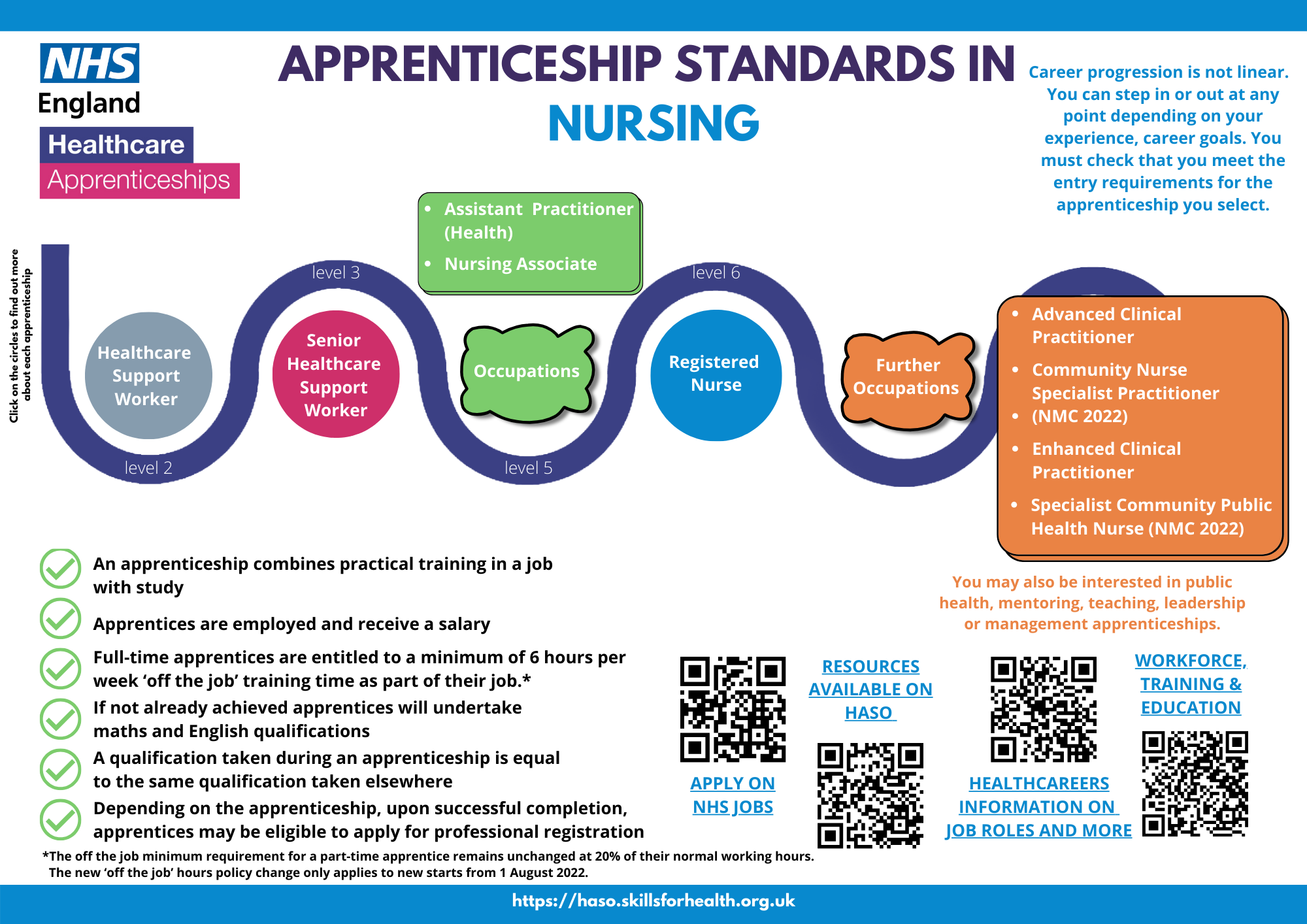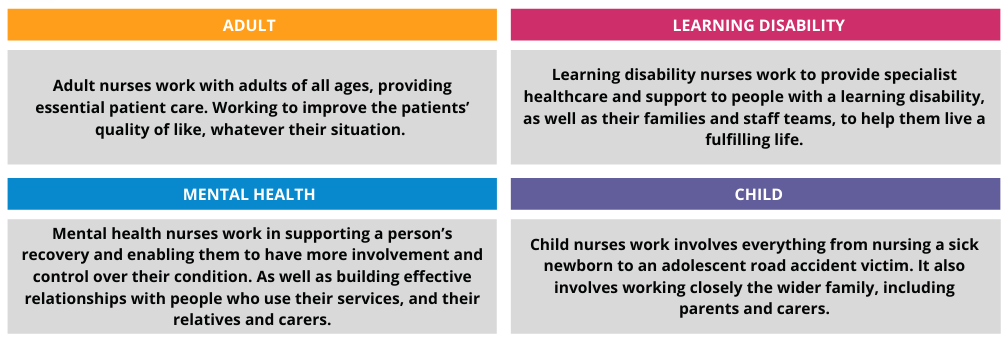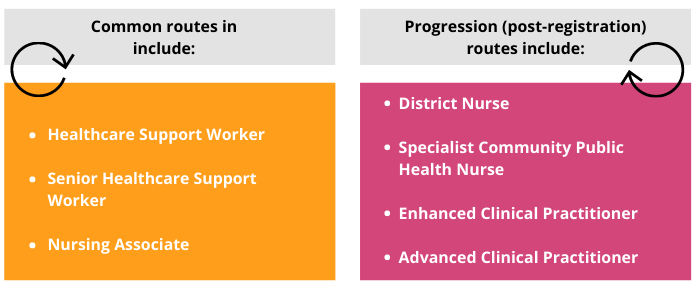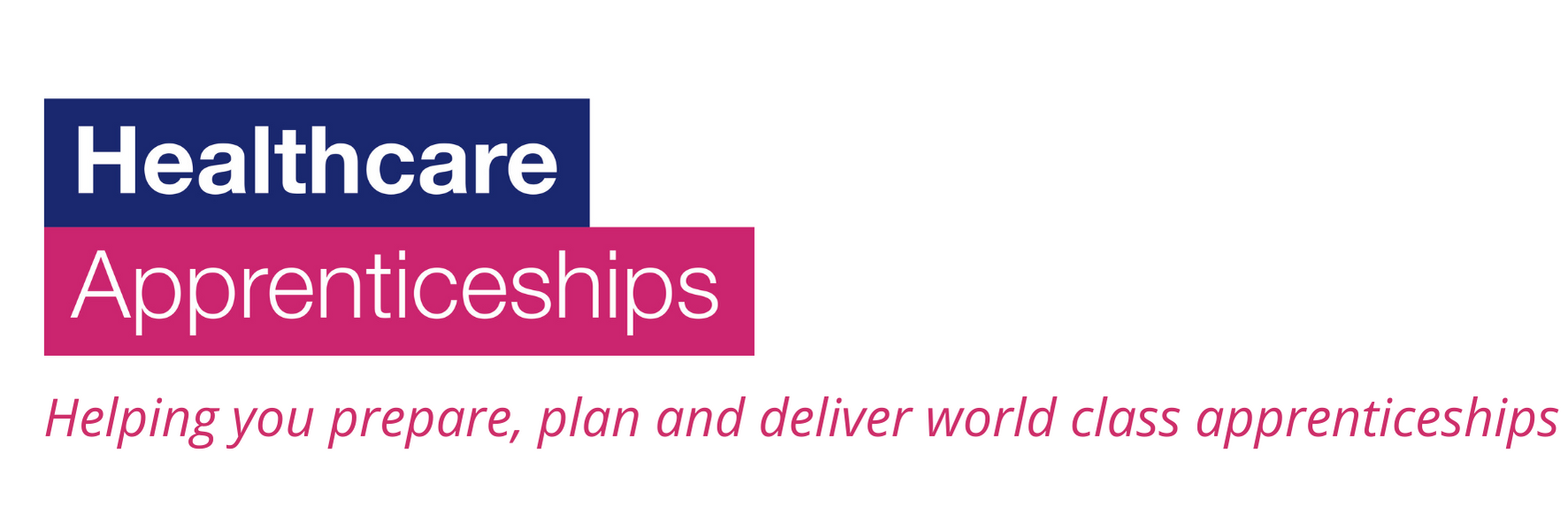Registered Nurse Degree Apprenticeship
 This page contains frequently asked questions, resources, useful links and tips to help you recruit and/or manage a registered nurse degree apprentice.
This page contains frequently asked questions, resources, useful links and tips to help you recruit and/or manage a registered nurse degree apprentice.
The employer support package for the Registered Nurse Degree Apprenticeship (RNDA) programme has now closed. This page will be updated if/when further funding is announced.
You can also visit the Nursing page on our Job Families section for further case studies and guidance.
The Apprenticeship Standards in Nursing printable gives a brief overview of the apprenticeship standards in this area.
-
The levy
The levy is payable by employers with a pay bill of over £3 million each year. You can only use funds in your levy account to pay for apprenticeship training and assessment. Apprentices must work at least 50% of the time in England. Each apprenticeship has a funding band allocated to it and employers can only use up to the funding band maximum for that apprenticeship from their levy money. The maximum funding band for the Registered Nurse Degree Apprenticeship is £26,000.
If the costs of training and assessment go over the funding band maximum, you will need to pay the difference with other funds from your own budget.
You can’t use funds in your levy account to pay for other costs associated with your apprentices (such as wages, statutory licences to practise, travel and subsidiary costs, work placement programmes or the setting up of an apprenticeship programme).
Download a printable guide of what can and can’t be funded with levy funds and access the Apprenticeship Funding rules.
You can find out more about apprenticeship funding in our Funding and Levy section.
-
What does a Registered Nurse do?
Registered nurses work in the NHS, the independent and voluntary sector in a variety of healthcare settings including a hospital, someone’s home, in the community, social care or in public health. A registered nurse interacts with a variety of service users, families and carers, and with an extensive range of health and care professionals and other agencies including social services, police, probation, prisons, housing, education, language interpreters and third sector agencies. They work with, support and facilitate the learning of a range of individuals from other health and care professions. Nurses usually work various shift patterns which enable care to be provided 24 hours per day, seven days per week, 365 days of the year. Registered nurses are a key part of the multidisciplinary teams that meet the integrated health and care needs of patients and service users.
‘Registered nurse’ is a statutorily regulated profession and the standards for proficiency are set by the Nursing and Midwifery Council (NMC). There are four fields of practice that nurses work in:

You can learn more about the different roles on the Health Careers Nursing section.
-
Entry requirements
Many people who apply to become a registered nurse apprentice will already be working in health or care, usually in a support role, and have significant experience of what it is like to work in the sector. Others may apply to become a registered nurse apprentice straight from school or college or as a career change from another sector. It is anticipated that a significant number of registered nurse apprentices will be progressing from being a Nursing Associate.
The RNDA is at degree level, which means that all applicants will need to achieve the same high standards and in-depth study expected from nursing students on traditional degree courses. Before becoming an apprentice, the applicant will typically need to have achieved English and maths (level 2 or equivalent), exceptions to this may be made by the approved education provider. They will also have to evidence that they meet the academic and/or experiential criteria set out by the employer and their partner education provider. There will be a selection process that they need to go through to secure their employment as an apprentice and their place on the degree programme.
-
On programme
The RNDA is employer-led. This means that the registered nurse degree apprentice is employed whilst studying at an approved education institution and undertaking a range of practice placements. Placements may be outside of their primary place of employment so that registered nurse degree apprentices gain the full range of skills and knowledge required by the Nursing and Midwifery Council for registration by the end of their apprenticeship.
Employers and training providers work together to ensure that the apprentice receives all the relevant on-programme training and is ready to pass both their degree and the end point assessment at the end of their apprenticeship.
The RNDA standard sets out the knowledge, skills and behaviours that the apprentice has to meet. You can download the standard document below. An outline of how they will be assessed at the end of their apprenticeship can be found in the assessment document. By successfully completing the RNDA, apprentices meet the requirements for entry to the Nursing and Midwifery Council statutory register and can apply to register as a nurse.
Training providers and End Point Assessment Organisations must be registered with the ESFA and, in the case of the RNDA, with the Nursing and Midwifery Council as an approved training provider. You can see which providers and EPAOs are currently offering the RNDA by clicking on the links below.
-
Case studies
To find out what it is like to work as a registered nurse degree apprentice, or to manage one, visit the case studies section here , use our case study search tool to learn more. The case studies also contain tips, lessons learned and how to implement RNDAs in your organisation.
-
Routes in and routes out
Registered nurses play a vital role in providing, leading and coordinating care that is compassionate, evidence-based, and person-centred. They are supported by a wider nursing team which provides an entry route into the profession and career opportunities after they have registered. Many of these roles are also available as apprenticeships.

Visit our pathways tool to explore this further.
- Resources
-
Get in touch
If you have questions, or need help, please contact the NHS England team on nursingapprenticeproject@hee.nhs.uk .


